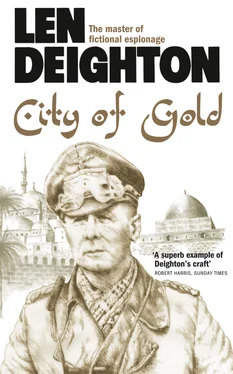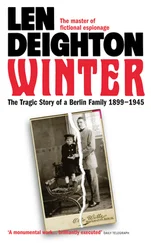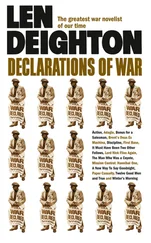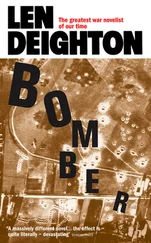Len Deighton
City of Gold

This novel is entirely a work of fiction.
The names, characters and incidents portrayed in it are the work of the author’s imagination. Any resemblance to actual persons, living or dead, events or localities is entirely coincidental.
Published by HarperCollins Publishers Ltd 1 London Bridge Street London SE1 9GF
www.harpercollins.co.uk
This paperback edition 2011
First published in Great Britain by
Century in 1992
Copyright © Len Deighton 1992
Introduction copyright © Pluriform Publishing Company BV 2011
Cover designer’s note © Arnold Schwartzman 2011
Len Deighton asserts the moral right to be identified as the author of this work
A catalogue record for this book is available from the British Library
CITY OF GOLD. Copyright © Len Deighton 1992. All rights reserved under International and Pan-American Copyright Conventions. By payment of the required fees, you have been granted the nonexclusive, nontransferable right to access and read the text of this e-book on-screen. No part of this text may be reproduced, transmitted, downloaded, decompiled, reverse-engineered, or stored in or introduced into any information storage and retrieval system, in any form or by any means, whether electronic or mechanical, now known or hereinafter invented, without the express written permission of HarperCollins e-books.
Source ISBN: 9780007385843
Ebook Edition © AUGUST 2011 ISBN: 9780007450848
Version: 2017-08-10
Epigraph
They say that the sergeant’s a very nice chap,
Oh what a tale to tell.
Ask him for leave on a Saturday night –
He’ll pay your fare home as well.
There’s many a soldier has blighted his life
Thro’ writing rude words on the wall,
You’ll get no promotion this side of the ocean,
So cheer up, my lads. Bless ’em all!
Trooping song
Cover
Title Page Len Deighton City of Gold
Copyright
Epigraph
Cover designer’s note
Prompted by seeing the renderings of my two murals for…
Introduction
Picture me, a scruffy tourist in bush shirt and slacks,…
Prologue
In the final months of 1941, General Erwin Rommel –…
1
‘I like escorting prisoners,’ said Captain Albert Cutler, settling back…
2
The region called El Birkeh, where so many of Cairo’s…
3
At Cairo the water of the Nile divides to make…
4
They’d given Jimmy Ross his predecessor’s quarters. He was in…
5
Having finished her shift at the Base Hospital, Peggy West…
6
Peggy’s fears, about taking Alice Stanhope to the Base Hospital,…
7
No one claimed to remember when or where or why…
8
To the casual observer, the soldiers seemed to belong here.
9
‘I like them. I think those two are the nicest…
10
‘Did you hear that it rained in the desert?’ said…
11
‘The balloon’s gone up,’ said Lionel Marker as he pressed…
12
Bab-el-Hadid barracks was a curious-looking, three-storey structure, built to look…
13
Alice Stanhope had learned to drive her father’s four-litre Brough…
14
Harry Wechsler had been thinking about Alice Stanhope right up…
15
This was a different world. In this strip of desert…
16
Peggy West had seen very little of Prince Piotr until…
17
‘It’s hush hush. Top damned secret, old boy.’ Wallingford grinned…
18
‘Alice tells me you have been thinking of going to…
19
‘It will soon be time to move on,’ Solomon told…
20
Robin Darymple was happier than he had been for months.
21
‘This is my favourite time of year,’ said Wallingford suddenly,…
22
Alice got the news from Peggy West. Peggy spent fifteen…
Postscript
About the Author
Other Books by Len Deighton
About the Publisher
Prompted by seeing the renderings of my two murals for Cunard’s new ship, Queen Elizabeth, Len Deighton suggested that I illustrate some of the covers of this next quartet of re-issues. I am delighted to be given the opportunity to draw once again, as it has been well over thirty years since my days as a regular illustrator for the Sunday Times.
While drawing the figure of Rommel against the background of Cairo’s Citadel Mosque for this book’s cover, I donned headphones and listened to the recording of Len Deighton’s Violent Ward, seeking inspiration for the design of that book. Fortunately the city under threat from the German Field Marshal and that of a modern-day Los Angeles are worlds apart so I was able to breathe life into the ‘Desert Fox’ even as I was being filled with images of the faded glamour, corruption and danger of the City of Angels.
Once again the internet assisted me in locating suitable pieces of ephemera for the back cover, such as the Second World War British Army Tank Corp badge, which is just like Field Marshal Montgomery’s. In preparing it for the camera, I took great pleasure in applying Brasso to the tarnished badge, a task that I had not undertaken since my days serving with the Royal Sussex Regiment in Korea – Monty would have been proud of me! I was also able to obtain a Desert Rat shoulder patch, plus an Afrika Korps sleeve band.
Among a collection of postcards given to me by friends who had acquired them on their Grand Tour, I found several of Cairo’s narrow passages and of the famous Shepheard’s Hotel, and even one of the hotel’s luggage labels.
The book’s spine displays the obverse of an Egyptian 2 piastres coin featuring the image of the sixteen-year-old King Farouk. His portrait is also on the 1940s Cairo stamped envelope. Observant readers will notice that each of the spines in this latest quartet of reissues features a metallic object; a subtle visual link that draws together four books written and set in very different times and places.
I have taken the photograph for this book’s back cover with my Canon 5D camera, and my illustration was drawn with an HB Staedtler pencil.
Arnold Schwartzman OBE RDI
Hollywood 2011
Picture me, a scruffy tourist in bush shirt and slacks, trudging along Cairo’s wide and dusty boulevards and through its grimy alleys. It is hot and I am weary, my old shoes are buffed to a glass-like sheen because I find it difficult to turn away the shoe-shine ‘boys’ of all ages who guard every street corner. In my hand there is a map. It is not a modern coloured map with adverts for discos and five star hotels; it is a hand-drawn one showing the city as it was in 1941. It is the work of Victor Pettitt and his wife Margaret, whose dedication and unique experience are helping me bridge the years. I look at Victor’s notes and thrust the map under the noses of appropriately aged passers-by and indicate what I am looking for but it is not easy to find someone who remembers a past that they would rather forget. Sometimes I am lucky, and this book was the result of the kindness and help of many people; friends and strangers. I hope you will enjoy it.
This story of World War Two is set in a short specific period when the city was threatened by the tanks and guns of General Rommel’s Afrika Korps. It was not only the future of Cairo that hung in the balance; a German occupation of the city would have cut Britain off from its vast supporting Imperial complex that stretched from India to Australia. And the greater part of the story I tell is closely based upon historical fact.
Читать дальше













